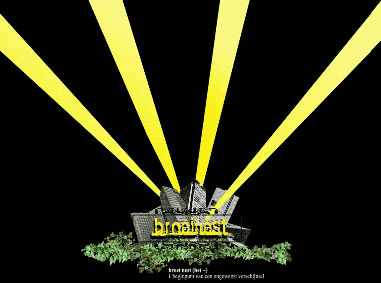Broeinest Programme November 2005
Het Broeinest - 03.11.2006 00:49
The November month has started, high time for the new Broeinest programme with films and discussion evenings. As usual, doors open from 7.30 pm, films/discussions take place between 8 and 11 pm and the bar opens until 12 for drinks.

Broeinest Amsterdam
Monday 6 November:
Film: Canadian Bacon (Michael Moore, 1995 91 min)
Monday 13 November:
Palm oil for green energy - rainforest destroyed by Essent?
Monday 20 November:
Don't shop - steal everything! and other anti-consumption campaigns
Monday 27 November:
Understanding economy - abolishing poverty: which strategy is successful?
************************
Monday 6 November:
Film: Canadian Bacon (Michael Moore, 1995, 91 min)
The only feature movie Michael Moore, known for his sarcastic (TV) documentaries, ever made. 'Canadian Bacon' made film history as a brilliant flop and never made it to the movie theatres in the Netherlands. But in fact, the film was ahead of its time: it sketches how the US government tries to stay in power without the Cold War providing an enemy picture to divert public opinion from internal social and economic problems. An initially idealist president (Alan Alda) has plans to use the state's budget for improving education and health provisions. However, his advisors (with buddies in the military industry) convince him that if he wants to stay in power and be voted in the next term, they would have to find a new enemy and start an ongoing conflict. Because the Russians refuse the US offer to start another Cold War, they finally find an enemy worth fighting, and the media happily jumps on the band wagon: Canada! ('they're all Communists: just look at their health care system, it's free!')
************************
Monday 13 November:
Palm oil for green energy - rainforest destroyed by Essent?
With an introductory film, Reanne Creyghton will present the Palm Oil Campaign of Friends of the Earth Netherlands (Milieudefensie). Currently, there is a campaign in the Netherlands trying to sell palm oil as a source of (green) energy. However, palm oil is one of the biggest accelerators for the destruction of the tropical rain forest in South East Asia. Palm oil plantations are surrounded by conflicts over local land rights. The Netherlands is the biggest importing country in Europe. Companies such as Essent and Biox like using the cheap and edible oil to burn it in their energy centres. The discussion about biomass cannot be held without tackling the issue of access to energy, food security, biodiversity and self-determination. In recent years, various NGOs have tried to put the issue on the agenda. But what has been the result? And which alternatives and action methods really have an impact? Learn and discuss about these questions at the Broeinest.
************************
Monday 20 November:
Don't shop - steal everything! and other anti-consumption campaigns
It's five days to the annual no-shopping day (25 November), which was once created from within Adbusters circles. A few actions will also take place in the Netherlands. Dick Verheul from 'Omslag' will explain their background. But we will also ask if these are effective. Is this a possible way to create consciousness about consumption patterns in the First World and change something about them? And what do other initiatives think, e.g. those who target producers, advertisers or sellers? Different strategies will be presented, from the 'steal everything day' and Yomango to the religious interventions of 'Reverend Billy', who is haunting Starbuck stores in the US, and so-called shop-dropping (leaving stuff behind when you go shopping, rather than taking it with you).
************************
Monday 27 November:
Understanding economy - abolishing poverty: which strategy is successful?
This is the third evening in the cycle 'understanding economy', in which we want to come closer to answering the question of which strategy helps to really change something about poverty and suffering in the world. On the first two evenings, we heard about, respectively, the history of the WTO and its underlying economic ideas/ideology and the related effects of the current economic system, mainly on Third World countries. But which actions would actually change the current situation? A reformed WTO? Fair Trade? Another form of development aid? A global basic income? Revolution? Regionalisation? And how come that although all the facts prove that it hardly makes a difference to the reality of the South, most of the big development organisations and NGOs continue to argue for a little (more) developments aid? We will present various solutions to the 'experts' and the public for discussion.
************************
Broeinest, Plantage Doklaan 10-12 Amsterdam
All evenings start at 20.00 o'clock, doors open at 19.30 o'clock.
Entry free, donations welcome!
************************
|

